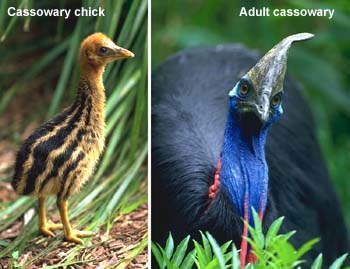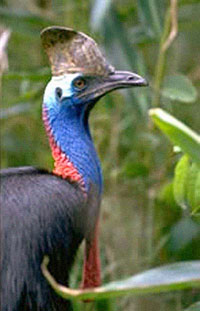Be Cass-o-wary safety tips
Report an injured or orphaned cassowary
- If a person has been injured by a cassowary, call 000 immediately.
- If you encounter an injured or orphaned cassowary, report it using one of the options listed below:
- Call 1300 130 372 (option 1, then option 2)
- Wildlife rangers may be in the field attending to other urgent matters. If your call is not answered, please leave a message with a detailed description of the location of the injured or orphaned cassowary.
- Wildlife rangers will respond to reports as soon as possible.
- Do not approach or attempt to move the cassowary.
- Use the free QWildlife app for iOS and Android.
- Use the online web form.
- Call 1300 130 372 (option 1, then option 2)
Report a cassowary sighting
To report a cassowary sighting:
- use the free QWildlife app for iOS and Android.
- use the online web form.

General tips
Being Cass-o-wary means knowing how to keep yourself safe around cassowaries as well as helping to protect these endangered animals.
Southern cassowaries are a special sight to see but they can be aggressive and unpredictable.
Follow these tips to help keep yourself, your family, your pets and the cassowaries safe:
- Never feed cassowaries—it is illegal, dangerous and has resulted in cassowary deaths.
- Always discard food scraps in closed bins and ensure compost bins have secure lids.
- Never approach cassowaries.
- Never approach chicks—male cassowaries will defend them.
- Always give cassowaries space and observe them from a safe distance.
- Never stop your vehicle to look at cassowaries on the road.
- Always slow down when driving in cassowary territory.
- Always keep dogs inside the yard, and on a leash when taking them out for a walk.
Never feed cassowaries
- Never feed cassowaries, fines apply.
- Never allow the cassowary to access your food. Cassowaries fed, intentionally or unintentionally, by humans can become bold and aggressive towards people.
- A cassowary that has been fed by the roadside begins to associate cars with food, this increases the risk of the bird being hit and killed by a car.
- Always keep food, cooking and cleaning items secure.
Give cassowaries space
- Never approach an adult cassowary—they’re wild animals and can be unpredictable. If you see a cassowary, admire it from a safe distance. A cassowary may feel threatened if approached.
- Never approach a cassowary chick or get between a chick and its dad. Cassowary dads are very protective of their young and will defend them.
- Always keep a safe distance while taking photos of cassowaries. Never chase after a cassowary for a photo opportunity.

What to do if you encounter a cassowary
What to do if a cassowary approaches you:
- Remain calm.
- Face the cassowary—never turn your back.
- Slowly back away.
- Try to put something between you and the cassowary such as a tree or your backpack when outdoors, or a piece of furniture or a rake when in your yard.
- If you have food or drink in your hands put it out of sight (like behind your back or in your pocket) where the cassowary can’t see it. Cassowaries may mistake mobile phones for food, so keep put it in your pocket or keep it out of sight.
Drive with care
- Slow down when driving in cassowary habitat. Cassowaries can cross the road unexpectedly.
- Never stop your vehicle on the road to look at a cassowary. This poses a risk to you, other drivers and the cassowary. Reduce your speed, safely avoid the cassowary and indicate to other drivers there is a cassowary nearby.
- Keep an eye out for young cassowaries following an adult across the road. Young cassowaries are stripy or brown and can be harder to see.
- Look out for bright yellow ‘Recent Cassowary Crossing’ signs on the side of the road. These signs help to notify drivers that a cassowary has been reported crossing the road in that area recently.
Tips for campers
Be Cass-o-wary when camping in cassowary habitat:
- Keep food and rubbish secured by packing it away in your car, caravan or tent. Cassowaries have been known to enter campsites in search of food and can become aggressive.
- Make sure you have an item, such as a broom or a chair, close by to place between yourself and a cassowary if it approaches your campsite.
- Always maintain a safe distance from a cassowary.
Tips for dog owners
- Keep dogs inside the yard and on a leash while taking them for a walk. Cassowary and dog interactions can result in injuries or death, for both cassowaries and our protective canines.
Species information
Learn more about the Southern Cassowary including its ecology, behaviour, what’s been done to help and what you can do.


